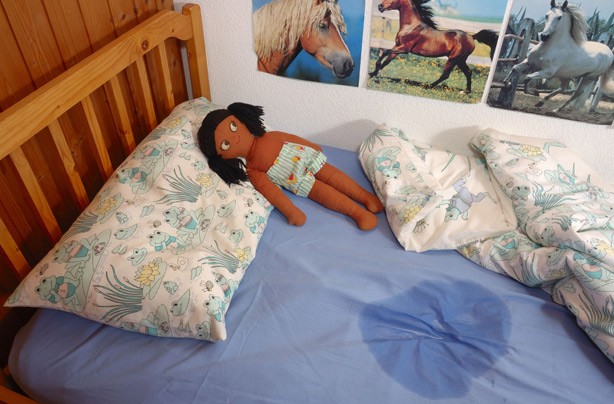 Now, I know that at the end of my last blog post I promised ya’ll that I would write my next piece on why children don’t act up. I’m gonna get to that at another time because right now I feel like I gotta address an important question this week.
Now, I know that at the end of my last blog post I promised ya’ll that I would write my next piece on why children don’t act up. I’m gonna get to that at another time because right now I feel like I gotta address an important question this week.
A married mother from Florida wrote me two days ago asked, “Mother Wit, should I spank my child for peeing in the bed?”
Her question came to me via e-mail just as I had finished reading a disturbing story online about the murder of another child. A few days ago in Harris County, Texas a young black mother snapped and whipped her 4-year-old son to death with a cord because he peed on himself in the car.
She put the boy in the tub and whipped him with a cord more than 20 times, before he stopped breathing. The boy’s sisters told authorities that the mother beat her son with a cord because “the belt was broken because mom kept whipping the kids so hard it broke into pieces.” You can read more details about the story here.
Lawd have mercy, I said to myself as I read this. I cried as I thought about that poor little baby being beaten and killed by his mama. And I thought about the mother. That’s some kind of rage she had pent up inside her that drove her to beat a child like that. Though the story didn’t say, I assume she was a single mom, with three kids, no help, and frustrated.
I was once in her shoes and there were times when I snapped on my three kids. I had so much on me – the bills, keeping a roof over our heads, and all kinds of stress. And so if my kids made a mess they only added to my stress. Looking back, I regret all those times I took my frustration out on them. In those moments when I took a strap to their backsides I never stopped to think that I could seriously do them harm or even kill them for doing what kids do – have accidents and make messes.
And I admit to ya’ll that I even spanked my kids for little things like wetting the bed or pooing on themselves. I believed they were doing it because they were lazy or to spite me. It wasn’t until my grandchildren came along that I learned that you should NEVER punish or degrade a child for having accidents or for something they can’t control.
When my oldest grandson turned five and was still wetting the bed, me and his mother told his pediatrician about the problem. I was surprised to hear the doctor say that bedwetting at that age was normal, even for kids up to age 8.
He also gave me a list of medical reasons why kids wet or defecate on themselves:
A small bladder. Your child’s bladder may not be developed enough to hold urine produced during the night.
Inability to recognize a full bladder. If the nerves that control the bladder are slow to mature, a full bladder may not wake your child — especially if your child is a deep sleeper.
A hormone imbalance. During childhood, some kids don’t produce enough anti-diuretic hormone (ADH) to slow nighttime urine production.
Stress. Stressful events — such as becoming a big brother or sister, starting a new school, or sleeping away from home — may trigger bed-wetting.
Urinary tract infection. A urinary tract infection can make it difficult for your child to control urination. Signs and symptoms may include bed-wetting, daytime accidents, frequent urination, bloody urine and pain during urination.
Sleep apnea. Sometimes bed-wetting is a sign of obstructive sleep apnea, a condition in which the child’s breathing is interrupted during sleep — often because of inflamed or enlarged tonsils or adenoids. Other signs and symptoms may include snoring, frequent ear and sinus infections, sore throat, and daytime drowsiness.
Diabetes. For a child who’s usually dry at night, bed-wetting may be the first sign of diabetes. Other signs and symptoms may include passing large amounts of urine at once, increased thirst, fatigue and weight loss in spite of a good appetite.
Chronic constipation. A lack of regular bowel movements may make it so your child’s bladder can’t hold much urine, which can cause bed-wetting at night.
A problem in the urinary tract or nervous system. Rarely, bed-wetting is related to a defect in the child’s neurological system or urinary system.
Once the doctor has established that your child does not have a medical problem then there are some other tips that can help you train your child:
- Get a urinary bed alarm. These alarms boxes are worn on the underwear or the pajamas and can sense moisture. When the sensor detects moisture almost immediately and sounds the alarm, alerting the child to get up and go to the bathroom.
- Limit fluids at night.
- Lifting. Make sure your child goes to the bathroom at night before bedtime. Then wake your child up after sleeping for two or three hours so they can use the toilet.
- Bladder training. Use an egg timer. Ask your child to let you know when they have used the bathroom. Tell them to hold it for a few minutes. You start with about five minutes and add a couple minutes each time. The goal is to get to 45 minutes. This process takes time and you should do it every day.
- Rewards and Encouragement. Use stickers or anything special to the child for a reward. Give them lots of praise and tell them that they are a big boy or girl for not wetting the bed or having accidents during the day.
I felt like I had to share these lessons and tips in this post because there’s absolutely no excuse for children being abused or killed for having accidents. You can wash out the stains and clean up a mess, but you can’t erase scars and bring back a dead child.



Recent Comments